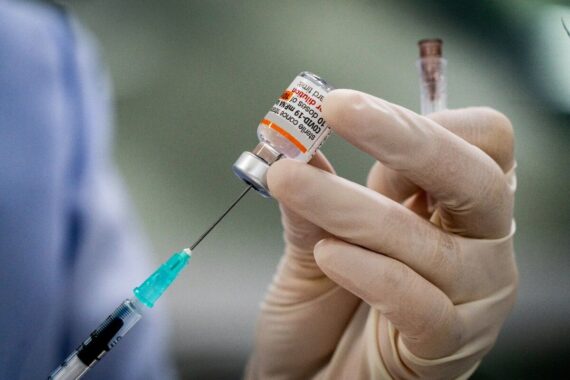Almost a quarter of adults ‘would be unlikely to accept flu vaccination’

Almost a quarter of UK adults would be unlikely to get the winter flu vaccine if they were invited, driven by vaccine inequality, a think tank has warned.
Structural barriers and vaccine inequality pose a greater threat to halting infectious diseases than hesitancy, a report from the Institute for Public Policy Research (IPPR) found.
Those in lower income occupations who are more likely to come into extensive contact with other people are less likely to take up the offer of vaccination. And the same group are more likely to trust low quality information sources like chat rooms and forums.
This suggests that vaccine inequality should be treated as an ‘injustice’ rather than a choice, the IPPR said.
Driving up vaccination rates is also key at a time when ongoing concerns about ill health and Covid are stopping some people from going out or to work to avoid mixing with others too much, the report added.
Polling done by YouGov to support the report found that nearly one in five adults still don’t feel safe in public spaces, such as restaurants or public transport, with those not in work a third less likely to feel safe.
This is likely to be a factor in the growing level of economic inactivity among working-age adults, currently at a six-year high, the IPPR said.
Among a series of recommendations to help remove barriers to vaccine uptake, the think tank called for the UK Government to work urgently with employers, schools and local communities to ensure more equal access to and uptake of vaccines.
This should be backed by £400m to support a locally-led effort across all local authorities, covering all vaccines.
The think tank also recommended that the Government reinstates the ‘Community Champions’ programme, deployed during the pandemic.
And it should set up a permanent Whitehall unit to monitor and counter online health disinformation and to step in immediately in the event of another public health emergency similar to the Covid-19 crisis, the report recommends.
Latest flu vaccine uptake figures show more than 77% of the over-65s have had their jab, along with 31.5%, of pregnant women and 44.4% of those in a clinical risk group.
Efua Poku-Amanfo, IPPR researcher and lead author of the report, said: ‘Vaccines are recognised as one of the most effective and cost-efficient health interventions ever created and save millions of lives every year, with over 100,000 deaths in the UK prevented by the Covid-19 vaccine in its first nine months.
‘We must continue to harness vaccine’s preventative potential in UK health policy, but their benefits are at risk due to vaccine inequality.
‘People on low incomes or from marginalised backgrounds are more likely to face barriers to taking up vaccinations. The government must learn the lessons from the pandemic and focus on structural solutions to tackle vaccine inequality.’
A Department of Health and Social Care spokesperson said: ‘Our phenomenal Covid-19 vaccination programme has been a huge success.
‘More than 151 million jabs have been given in the UK in just two years, saving more than 100,000 lives, and more than 16 million people have already had their autumn booster jab.
‘We’ve worked with the NHS to provide advice and information at every opportunity on how to get a vaccine and its benefits – including through partnerships with clinicians, vaccine experts, social media platforms, local authorities, faith groups and business.’
A Pulse investigation has highlighted variation across England in the use of acute respiratory infection hubs to relieve pressure on GPs, with only a handful up and running.
Pulse October survey
Take our July 2025 survey to potentially win £1.000 worth of tokens

Visit Pulse Reference for details on 140 symptoms, including easily searchable symptoms and categories, offering you a free platform to check symptoms and receive potential diagnoses during consultations.












